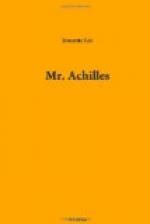“I remember—” The surgeon held out his hand. “Let her come. She will be invaluable.” His voice had a friendly ring. It was no longer a millionaire that faced him—handing out cheques—but a father, like himself. There were four of them at home, waiting on the stairs for him to come at night—and he suddenly saw that Philip Harris was a brave man—holding out for them all—waiting while the little fleck of grey matter knit itself. He looked at him a minute keenly—“Why not come in yourself, now and then,” he said, “as he gets better? Later when you take him away, he will know you—better for him.”
So the ward became familiar with the red face and Prince Albert coat and striped trousers and patent leather shoes, crunching softly down the still, white room. It was a new Philip Harris, sauntering in at noon with a roll of pictures—a box of sweets, enough candy to ruin the ward—a phonograph under one arm and a new bull pup under the other. The pup sprawled on the floor and waked happy laughs up and down the ward and was borne out, struggling, by a hygienic nurse, and locked in the bathroom. The phonograph stayed and played little tunes for them—jolly tunes, of the music hall, and all outdoors. And Philip Harris enjoyed it as if he were playing with the stock exchange of a world. The brain that could play with a world when it liked, was devoted now, night and day, to a great hospital standing on the edge of the plain, and to the big free ward, and to a dark face, flashing a smile when he came.
XVIII
“ONCE—I—SAW—”
Miss Stone sat by the boy on the lawn at Idlewood. A great canopy of khaki duck was spread above them, and the boy lay on a wicker couch that could be lifted and carried from place to place as the wind or the sun, or a whim directed.
Five days they had been here—every day full of sunshine and the fragrance of flowers from the garden that ran along the terraces from the house to the river bank, and was a riot of midsummer colour and scent. The boy’s face had gained clear freshness and his eyes, fixed on Miss Stone’s face, glowed. “I like—it—here,” he said.
“Yes, Alcie.” Miss Stone bent toward him. “You are getting strong every day—you will soon be able to walk—to-morrow, perhaps.” She glanced at the thin legs under their light covering.
The boy laughed a little and moved them. “I can walk now—” he declared.
But she shook her head. “No, I will tell you a story.” So her voice went on and on in the summer quiet—insects buzzed faintly, playing the song of the day. Bees bumbled among the flowers and flew past, laden. The boy’s eyes followed them. The shadow of a crow’s wing dropped on the grass and drifted by. The summer day held itself—and Miss Stone’s voice wove a dream through it.
When the boy opened his eyes again she was sitting very quiet, her hands in her lap, her eyes fixed on the river that flowed beyond the garden. The boy’s eyes studied her face. “Once—I—saw—you—” he said. His hand stole out and touched the grey dress.




